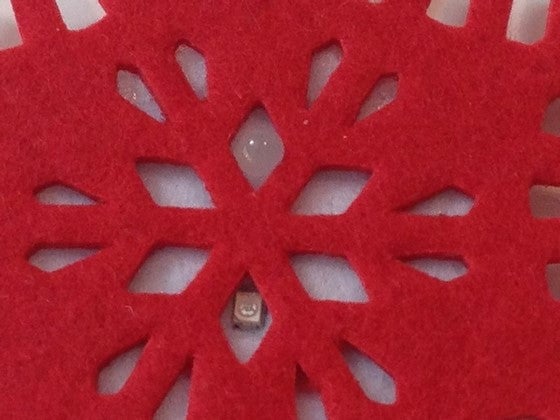Description
Laser cut textiles items are extremely popular in the shops, especially for items for the home such as table mats and Christmas decorations.
Many of these items are ideal for adding LEDs and for creating exciting projects as they are generally relatively cheap to buy. The lace type patterns provide ready-made holes for displaying LEDs effectively, the fabric doesn’t fray and is easy to stitch and manipulate.
The design for this snowflake project could be adapted for a range of other laser cut textiles items. The project uses a light sensor cell holder which automatically turns the LED on in low light levels. The cell holder also has an on/off switch on the surface to switch it off completely. The light sensor cell holder could be replaced with the basic switch cell holder as it is applied in the same way just without the hole in the fabric for the sensor.
Learn how to:
- Create a circuit using a light sensor cell holder.
- Use a standard LED in a circuit.
Level of difficulty:
- Beginner.
Parts list:
In order to create your laser cut decoration you will need:
- Laser cut placemat or similar item.
- Backing felt in a contrasting colour.
- Ribbon for hanging (approx. 20cm).
- White standard LED.
- Light sensor cell holder and cell.
- Conductive thread.
- Ordinary sewing thread.
You will also need the following equipment:
- Large eye e-textile needle.
- Round nosed pliers.
- Fabric glue.
Step-by-step guide to making a Laser Cut Light Up Christmas Decoration.
Step 1

Cut 2 pieces of felt the same size as the back of the laser cut material so that all of the holes are covered. Lay the laser cut fabric on top of the backing fabric and mark off the points where the LED and light sensor will sit. Use a specialist fabric marker pen that is non-permanent e.g. one that disappears when exposed to air after about 48 hours or one that disappears when dabbed with water.

Cut two small holes in the backing fabrics where the marks were made. Cut the holes big enough for the LED and light sensor to poke through.
Step 2

Use a pair of round nosed pliers to twist the negative leg on the LED into a loop.

Push the LED through the top hole in one layer of the backing fabric.

Push the twisted negative leg flat to one side and oversew it onto one layer of the backing fabric. Make sure that your stitches are tight.

Place the cell holder below the LED so that the light sensor pokes through the remaining hole in the backing fabric. The negative side of the cell holder should be below the negative side of the LED. Use small running stitches to get from the LED to the cell holder. Carefully hold the cell holder in position and oversew the cell holder into place.
Step 3

Use the round nosed pliers to twist the positive leg on the LED into a loop.

Using a new piece of thread, oversew the positive leg onto the backing fabric.

Use small running stitches to take the thread to the positive side of the cell holder and oversew it into place, making sure that the negative and positive sides don’t touch. The circuit is now complete.
Step 4

Test your circuit by sliding the cell into the cell holder with the positive side facing upwards. Don’t forget that the small slider on / off switch on the cell holder will need to be switched on. You will also need to be in a darkened room for the light sensor to work.
Step 5

Oversew the hanging ribbon into place. Although this could be done at the end, it is better to be done now as the thread gets caught easily on the circuit.

Lay the second layer of backing fabric on top of the LED and light sensor. This layer of fabric hides the stitches.

Use fabric glue to hold the two layers of fabric together around the edge. If you have a piece of scrap fabric, check your glue beforehand to make sure that it doesn’t show through the fabric. The layers could be stitched together if preferred.

Apply a layer of fabric glue to the front of the backing fabric and stick it onto the laser cut fabric, making sure that the LED and light sensor line up with the holes in the laser cut fabric.The light sensor is a small square raised section on the back of the cell holder and this must not be covered by anything in order for the sensor to work.

Depending on where the Christmas decoration will be used, the circuit could be covered over with another piece of felt to hide it. Remember to leave an access point at the bottom to allow you to change the battery and to access the on / off switch.
Download a pdf version of this page here. ![]()
This tutorial was produced for Kitronik by Julie Boyd who is a specialist in E-Textiles design.




